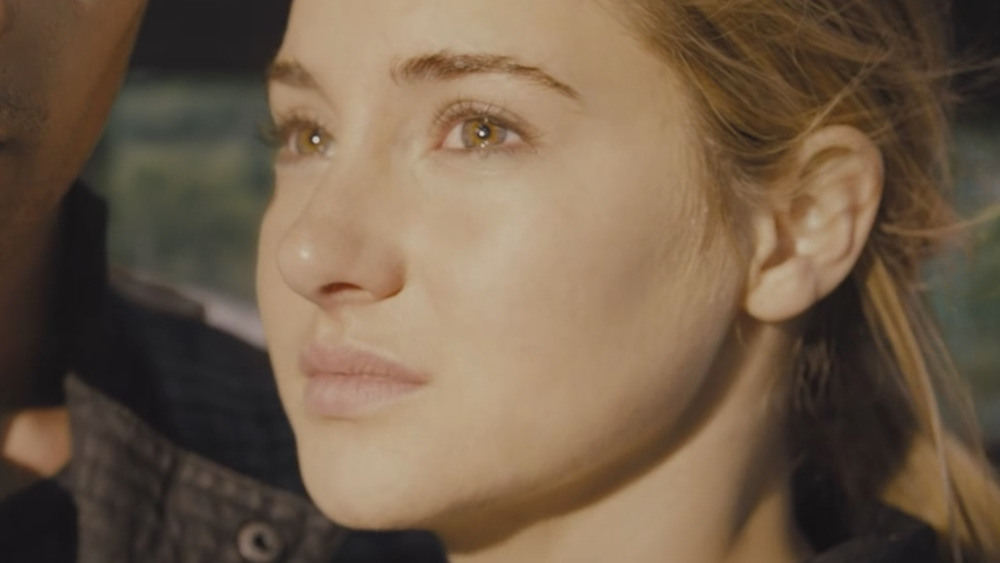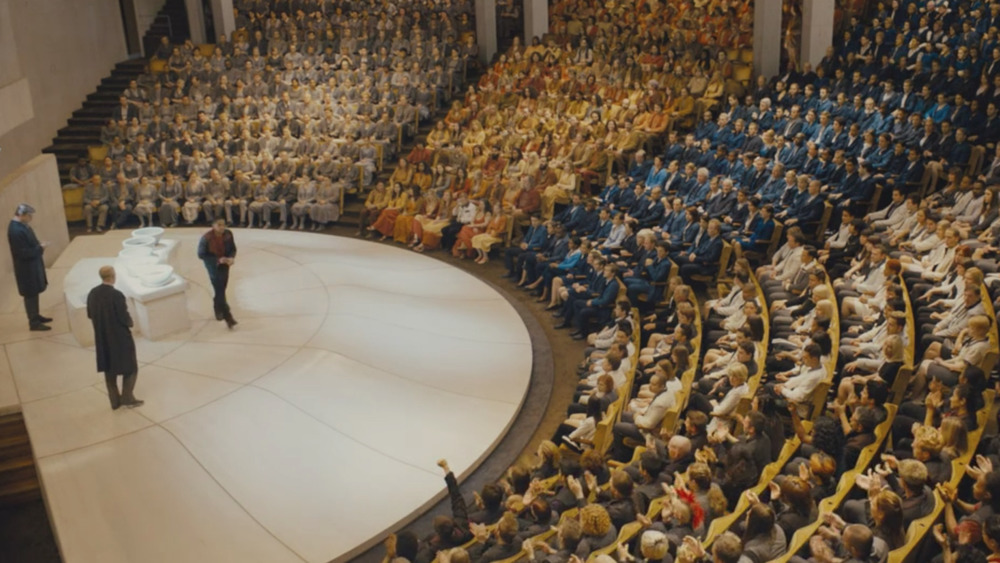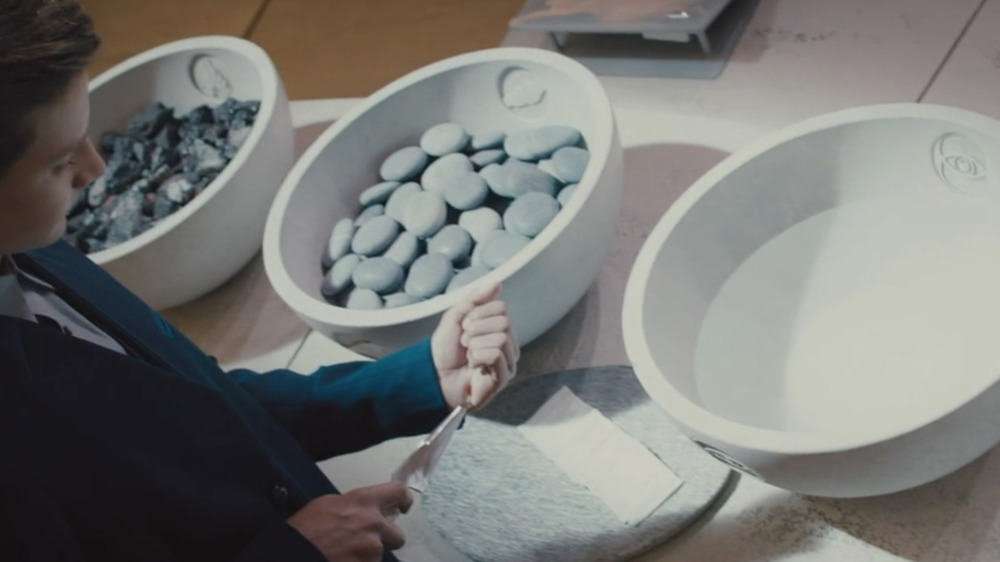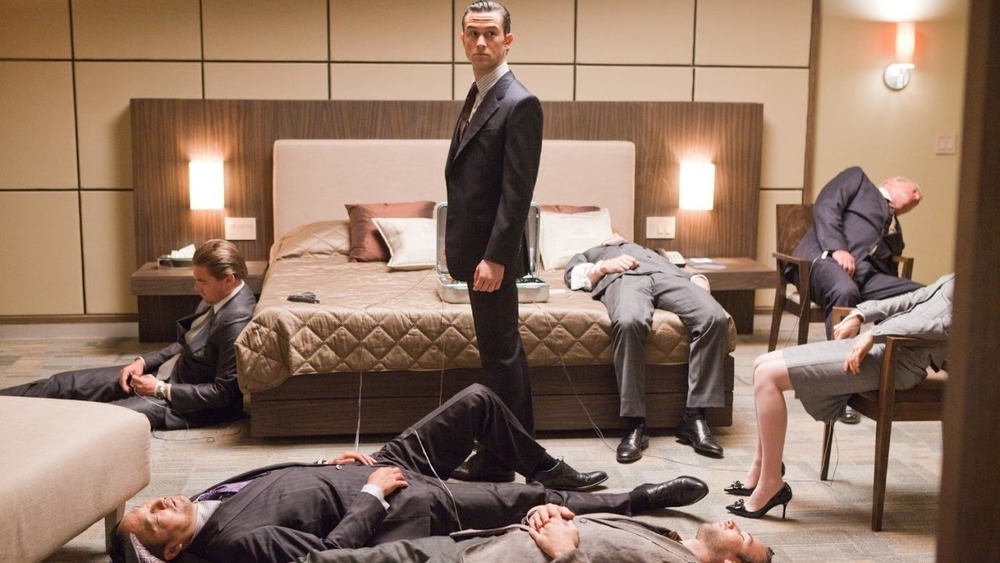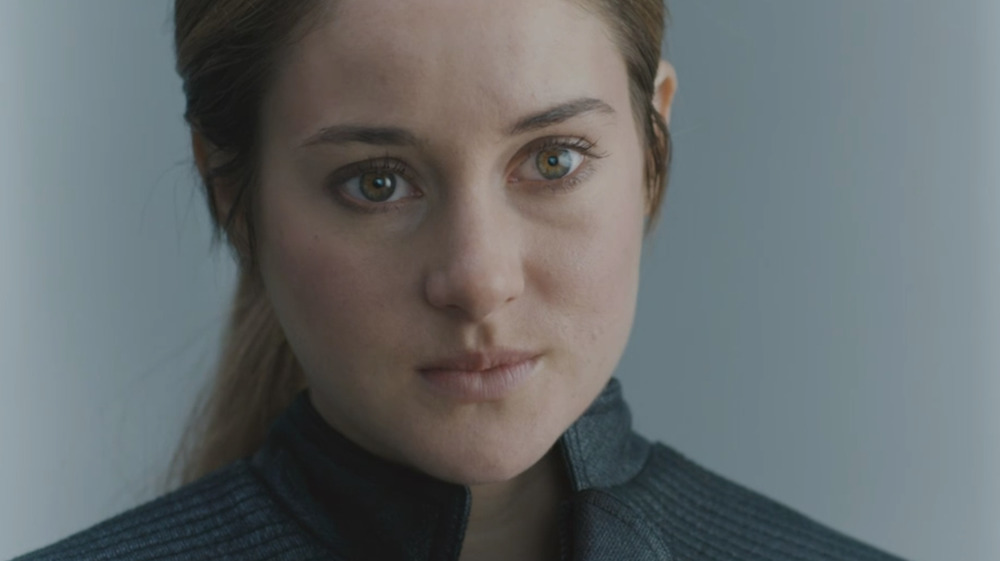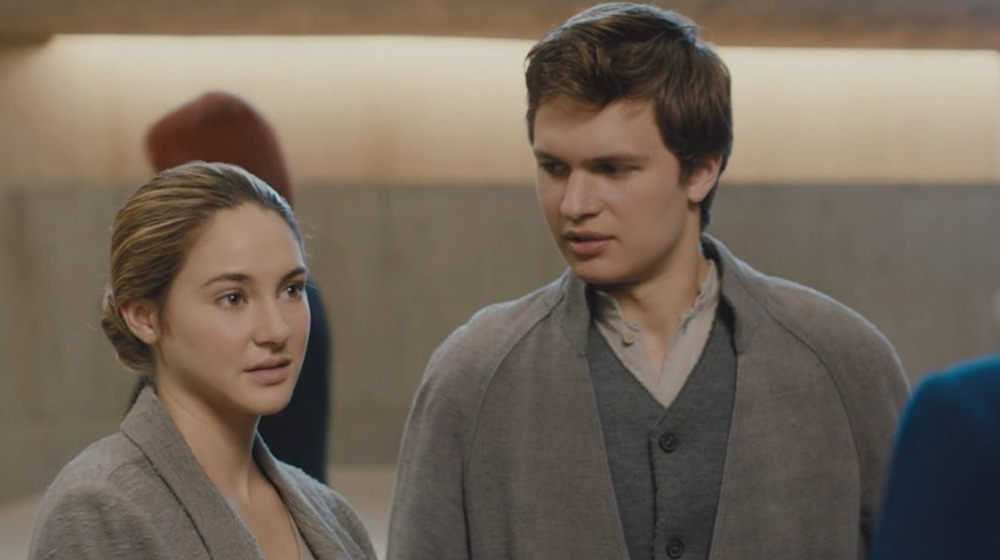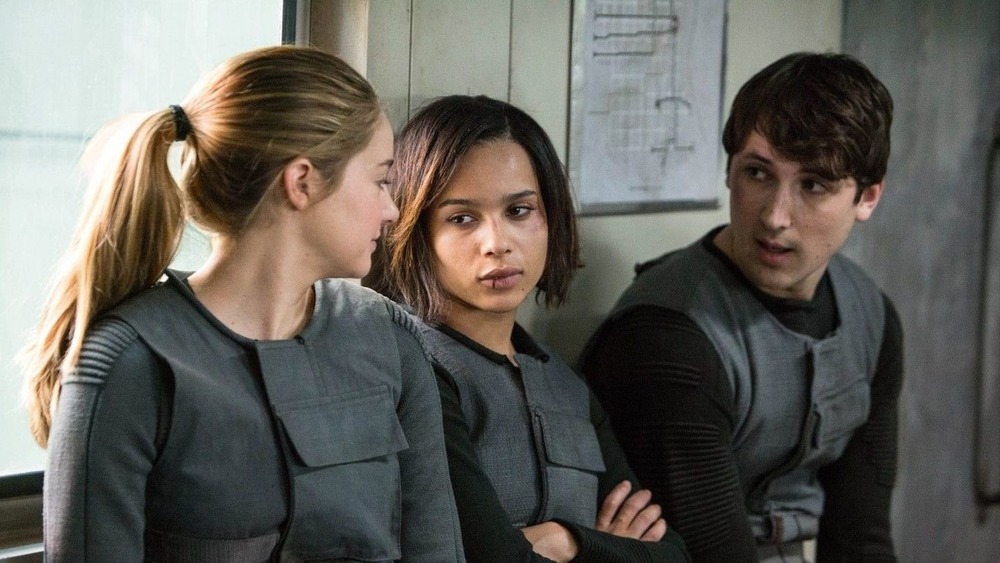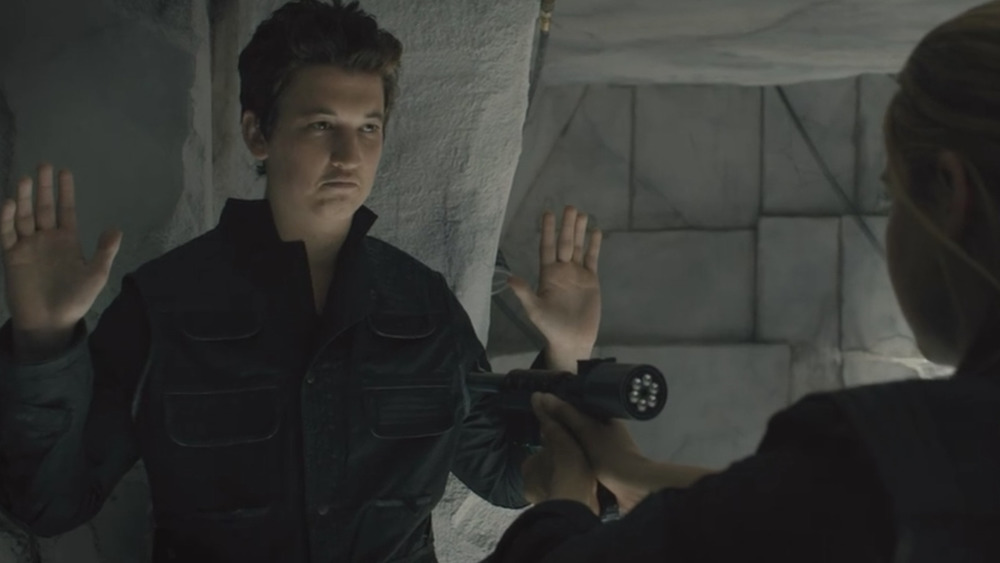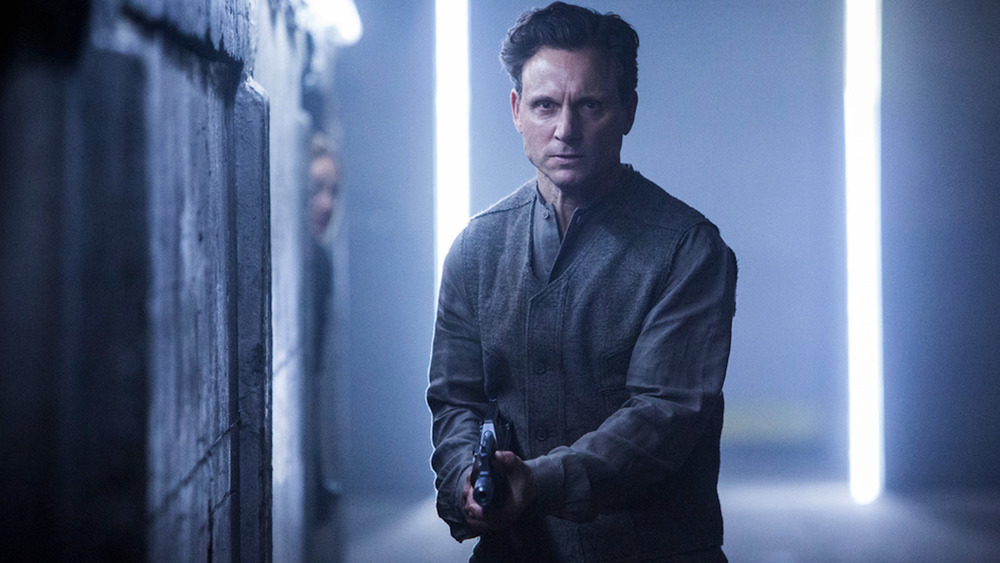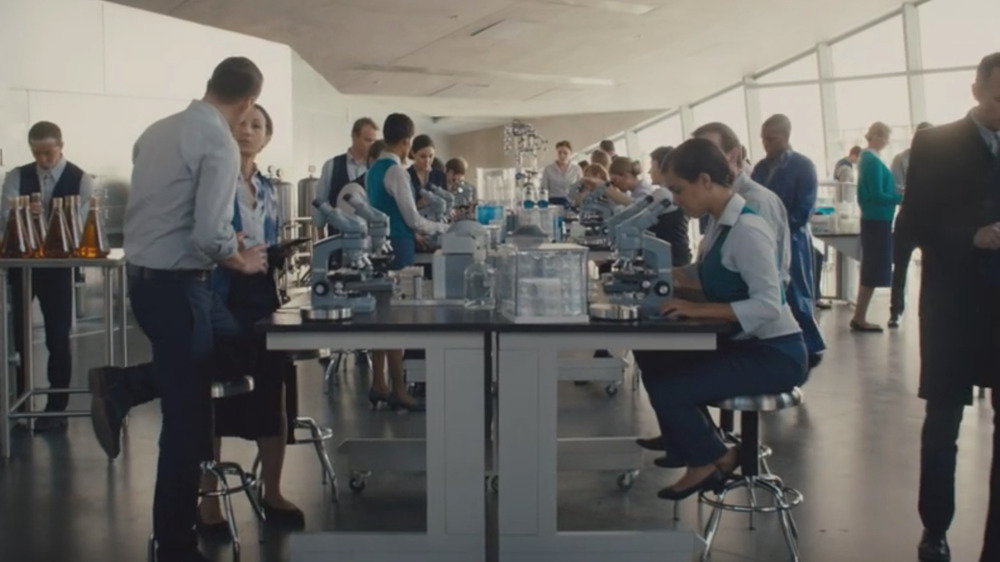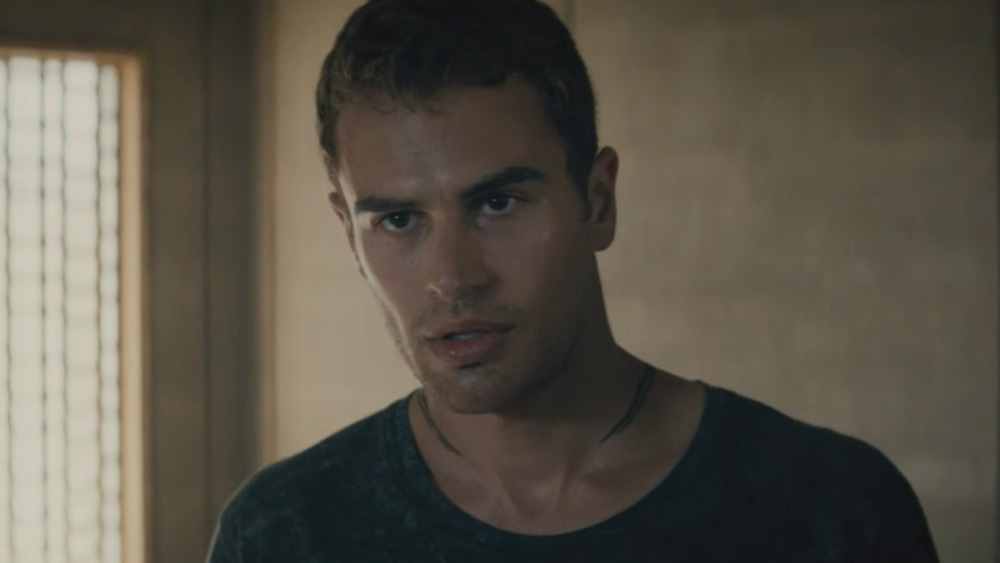Things Only Adults Noticed In Divergent
A story that features young adults fighting for freedom in a grim totalitarian future is a surefire way to captivate a movie audience. On the heels of The Hunger Games' success came a wave of films centered around dystopian teenage angst. Divergent was among the most successful entries in this trend: The first production in the series boasted a hearty budget and a fresh-faced cast that led to a $288 million worldwide box office hit.
Divergent takes place in an unrecognizably run-down Chicago of the future. The population of the city is divided into five factions that each play a unique role in helping society function peacefully. Enter Tris (Shailene Woodley), who struggles against this rigid system.
The movie kicked off the franchise, showcased the genre's mass appeal, and made us wonder why Theo James isn't in everything. A coming-of-age tale intertwined with romance and sci-fi, Divergent targeted a younger audience. Adults weren't exactly unmoved by the movie's hopeful message, but they picked up on details that many tween and teen viewers missed. Here are the elements of Divergent that only grown-ups noticed.
Characters can choose whatever faction they want
In the world of Divergent, when someone turns 16, they're subjected to an aptitude test. To take this test, teenagers plug into a mechanism that plants their consciousness into a dream world with scenarios for them to navigate. The results determine which of the five factions best suits them. Once teenagers enter a faction, it's a lifelong commitment.
Unfortunately (or fortunately, depending on how you look at it) for Tris, she's Divergent, so she doesn't get a definitive answer about where she belongs. Her choice of a faction called Dauntless is meant to be seen as an expression of free will that makes her special. Adults will notice, however, that every single person living in the ruins of Old Chicago has this quality.
There's no law in this society that an initiate must choose the faction matching their test results. The plot hinges upon Tris' uncertainty, but picking Dauntless isn't unusually radical. It's possible she chose that faction because it's the complete opposite of her family's faction (Abnegation), and teenagers just love defying their parents.
Ultimately, this underscores the point that the citizens of this 1984-esque society have trapped themselves in a mental prison. They don't need a dictator to enforce written rules; they've internalized the rejection of personal choice.
Mostly, we're just curious about how this society manages to suppress teenage rebellion. We can't even get our kids to do the dishes.
The water at the choosing ceremony stayed clear
The choosing ceremony is quite dramatic. One by one, initiates step onto a stage in front of the community. There are bowls on the platform filled with objects symbolizing each faction: stones for Abnegation, lit coals for Dauntless, soil for Amity, glass for Candor, and water for Erudite. The initiates make their selection by cutting their hands and dripping their blood into one of the bowls.
Adult viewers immediately think about how disgusting and unsanitary those bowls are going to be by the end of the ceremony. Several initiates go before Tris, so when she finally steps up to make her selection, you'd expect to see carnage. Instead, the bowls are inexplicably gore-free.
This could be a film continuity issue, a deliberate choice to help keep the movie's rating PG-13, or just part of the ceremony's mystery. No matter the reason, rapt teen audiences might not notice this detail, or might be more willing to suspend disbelief. Still, the detail pulls adults out of Divergent's reality for too long.
The series borrowed from Inception
Under sedation, the initiates in Divergent enter a mental rat race built partly by their own psyche and partly by a simulator. Vivid dreamscapes aren't revolutionary thematic devices; films as diverse as the classic The Wizard of Oz, Terry Gilliam's Brazil, and cult anime feature Paprika have used them. Around the time Tris dives into the mind of her love interest, Four, to face his fears with him, though, the mechanics begin to feel familiar for adults.
Young audience members probably don't pick up on this, but any adult who remembers the mental roller coaster of 2010's Inception will recognize it right away. The entrance into the dream world is almost identical to Christopher Nolan's mind-bender. The rules of the simulation in Divergent are hazy, but it seems like jarring events (such as sudden death) will pull the dreamer back to reality — just like in Inception.
Reality is also slightly distorted in Divergent. Nothing overtly defies the laws of physical reality — not the way that Neo zips off into the sky in The Matrix, for instance — but there are slightly surreal elements. These subtle variations also exist in Inception's primary story, fueling fan theories that the ending, which ostensibly takes place in reality, is actually just part of an extended dream.
Tris' mental trials don't make sense
The Dauntless is a mighty faction primarily known for bravery. Upon initiation, new members must undergo training, which includes more simulations using the device from the aptitude test. Even the most courageous Dauntless trainees have fears hidden deep in their psyches that they must face in a series of rapid-fire trials.
Since Tris is Divergent, she can recognize the falseness of this manufactured reality in a way that's akin to lucid dreaming. This enables her to identify shortcuts her peers can't. Tris may be able to see these solutions and circumvent each task, but her terror is still quite real.
Tris doesn't fully grasp what Divergence means; she only knows that she needs to keep it a secret. Society views the rare Divergent person as a threat to be eliminated immediately. You'd think that her anxiety about being discovered would affect the trials she must overcome, but instead, the simulator gives her obstacles like crows, flames, and water tanks.
Maybe the device is broken, or maybe Tris' fears manifest as weirdly symbolic scenarios (if it's the latter, we're still puzzling over what the water tank could represent). Either way, teenage viewers probably don't question this as much as adults do.
The timing of the choosing ceremony isn't explained
Adapting written works to the big screen pretty much always entails losing some detail from the original. Teens who read the book first have additional context that helps explain certain elements of the film. Adults who don't frequent their library's YA section don't get the benefit of that background information.
Grown-ups were probably scratching their heads during the choosing ceremony in Divergent. Tris and her brother, Caleb (Ansel Elgort), are initiated in the same year. The ceremony is supposed to take place at age 16, but Caleb is older than Tris. Why is he participating in the event? It's possible that the two were born less than a year apart, but the likelihood of the ceremony falling in that small window when the two are the same age is slim.
However, in the book, it's explained that Caleb didn't make the cutoff for the previous year, so they wound up in the same ceremony. A single line of dialogue in the film could have eliminated this confusion, but alas, those of us unfamiliar with the source material are left to wonder.
Few faction recruits actually look 16 years old
The initiates are meant to be 16 years old. The film cast a slew of fresh-faced ingenues to round out the new batch of initiates, but most of these supposed teenagers could order a drink without a bartender batting an eye. Teens and younger viewers tend not to pick up on subtle effects of aging, so it's mostly adults who notice that a lot of these characters look remarkably like 28-year-olds.
A large portion of the cast was much older than their character counterparts. Shailene Woodley was 23 years old when Divergent was released, a good deal older than the 16-year-old Tris. At the time of the film's release, Zoë Kravitz (Christina) was 25, and Miles Teller (Peter) was 26. While Four isn't one of the fresh initiates, Theo James (Four) was closer to 30 when Divergent was released — a far cry from the 18-year-old book version of Four.
The Erudites should have seen Tris coming
The leaders in Dauntless inject all members with a tracking device. There's also a nifty mind-control serum in the injection that turns the defenders of derelict Chicago into mindless drones. Only Divergents are immune to the effects of the serum, so Tris and a few others still have free will.
Using a new serum, the power-hungry Erudite faction forces members of Dauntless to attack the ruling Abnegation faction. Tris, Four, and a few other Divergents escape the mayhem and return to Dauntless headquarters to stop the assault. They supposedly enter through an unguarded secret entrance, but adults who remember the tracking devices probably wonder how they maintain their element of surprise.
The Erudites in the control room keeping tabs on all their chipped Dauntless drones would have seen Tris and the gang headed their way. Their maneuver is completely out of line with the rest of the troops, but somehow doesn't trigger any alarms in headquarters. This oversight is particularly surprising since the Erudites are supposed to be the brainy ones.
Perhaps this whole movie is just an entertaining extended metaphor about being too smart for your own good.
Tris' dad didn't have to die
Dystopian Chicago residents all have a rough day when the Erudite faction leads a genocidal attack against Abnegation, but no one has it as bad as Tris. She watches her comrades mindlessly kill her home faction, and her mother (Ashley Judd) tragically dies in her arms.
Her father (Tony Goldwyn) also dies in a way that's meant to be emotionally devastating and heroic. Cynical adults might not view it that way, though.
While sneaking back into Dauntless headquarters, Tris and others come across a group of soldiers guarding the tunnels below. They have the element of surprise and the ability to take out the rival squad. Her dad has a mind of his own, though. Rather than formulating a plan, good ol' Dad marches down the hallway and fires away at the opposing squad. They, of course, return fire, and Tris' dad goes down in a hail of bullets. To adults, his death seems silly, like someone trying and failing to be Rambo.
The Erudites aren't as logical as they seem
Every faction in Divergent is responsible for a different element of society, with responsibilities that suit the traits of their members. The Erudites — mostly scientists, teachers, and doctors — would probably score high on IQ tests. Their pursuit of knowledge stems from their desire to avoid humanity's past mistakes, which they blame on ignorance.
Despite their intelligence, the Erudite's planned takeover doesn't make sense. They believe that Abnegation is sabotaging the faction apparatus and will lead to its downfall; ergo, they must wipe Abnegation out. If they'd been successful in their genocidal mission, though, society would have been left with a void equally destructive to the faction system. The flaw in their logic is exactly the point of Divergent, but it tends to go over the heads of viewers with less life experience.
The real issue is that Erudites are scared of anything they don't understand. If the gift of genius comes with an irrational fear of unknowns, then we're content with blissful ignorance.
Four picked his name before he faced his four fears
Joining a new faction represents a new identity for the characters in Divergent. After Tris selects Dauntless, she heads out of the ceremonial chambers and joins her new peers. Before beginning her training, she decides she'd like to be known as Tris — a much cooler-sounding moniker than her birth name, Beatrice.
This seems like a fitting time to pick a new name. This leads us to wonder: How did Four, whose birth name is Tobias, get his sobriquet?
The new recruits undergo rigorous physical training in what's referred to as Phase One. After they've sufficiently beaten the snot out of each other, they move on to the mental simulations of Phase Two. Four reveals to Tris that inside this nightmare generator, he always faces four fears — hence the name.
Does this mean that he went through all of Phase One in Dauntless and most of Phase Two before suddenly demanding that everyone refer to him as Four? Or did he pick the name earlier, without knowing that he had just four fears? Adults might question this little oddity, even if teens are too busy swooning over heartthrob Theo James to care.
